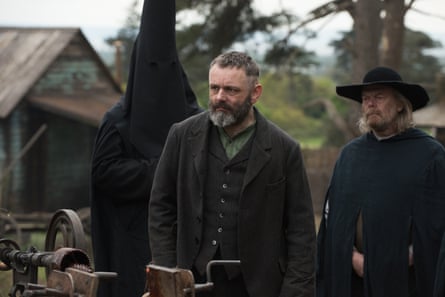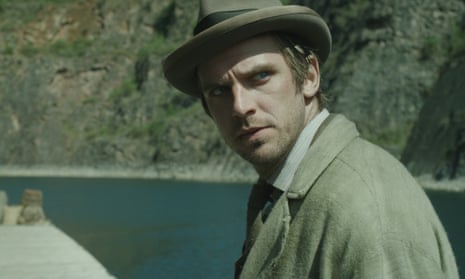Apostle, director Gareth Evans’ first feature-length effort since his pair of The Raid action films achieved instant underground infamy, is that rarest of treats: a horror movie that starts out as one thing, and finishes having mutated into another.
Exhilarating to watch and tricky to write about, similar to such films as The Box and the more recent Annihilation, going beyond surprising its audience with mere twists, instead shaking its own constructed reality off its axis. A full shift occurs not just in tone, with suspense boiling over into scalding insanity, but in the narrative mode, as the established set of unspoken rules governing the universe get violently upended. As soon as the viewer believes they’ve got a grip on what sort of horror story they’re in for, Evans demonstrates that in the chaotic universe contained within his camera, anything can happen. And just about everything does; Evans’s maximalist more-is-more ethic piles on one Grand Guignol spectacle after another, building to an operatic, hallucinatory climax that leaves our puny reason behind for a metaphysical nirvana. Polarizing yet undeniably fascinating, the bait-and-switch horror film lures its viewer into a false sense of terrified security before pouncing in an anything-goes frenzy, and Evans’s latest is a prime specimen.
For the first hour, he’d like you to believe you’ve wandered into a particularly reverent Wicker Man homage, and he makes the legwork of setting this trap a diversion all its own. At the dawn of the 20th century, a wastrel by the name of Thomas Richardson (Dan Stevens) rouses himself from an opium stupor long enough to accept an assignment from the upper-crust family that’s finally found a purpose for their black sheep. He’s to set a course for the lush, faraway island where his sister Andrea (Lucy Boynton) has been taken captive by the mad prophet Malcolm (a vainglorious Michael Sheen) and his loyal followers. Relative even to his expectations for a secluded sect of zealots, Thomas immediately senses something’s amiss. Malcolm’s brood follows religious convictions, but Thomas can’t figure out what they actually worship. Naturally, their notions of the sacred and the profane commingle in blood.
At first, Evans adheres to expectations, both of his genre and of himself as a stylist. This strain of period barbarity calls for fittingly baroque torture, and he doesn’t play it stingy with the grotesquerie. (Cracked craniums, snapped spines, and flensed fingers – oh my.) Stretching racks, crude forceps, and drills of every shape and size push the gloriously gratuitous set pieces to continue topping themselves, and from the looks of it, the Netflix bean-counters spared no expense on corn syrup. Evans works with gore the way Pollock worked with oil paints, slathering layer after layer until the hectic disorder emerges as the focal point. He keeps with that manic pitch in his shooting, which favors the whip pans and shaky handheld work that made the Raid movies into a sedentary cardio workout. Though the milieu and premise don’t allow for quite as much hand-to-hand combat, Evans can’t resist sneaking in a beatdown or two, nimbly handled by Stevens as he continues to prove and re-prove his potential as an action hero. In a just world, the James Bond tuxedo would await.

He takes a circuitous path through a subplot involving a forbidden romance between villagers to get there, but when Evans does arrive at the changeover to complete lunacy, he lavishes the patient faithful with exquisite punishments. There’s going for it and then there’s going for it, and only a director in the latter camp would dare to attempt the back half’s unholy fusion of BDSM, gothic, and exploitation-blood-bucket aesthetics. He indulges every artistic whim, no matter how outré, a dicey strategy that only works when a director has technical skill and clarity of vision. Evans has the first in spades, working aerial and low-angle shots for all they’re worth, lacking only in the second. He starts to lose the thread as supernatural elements come into play, and yet any resultant confusion fits right in with the final act’s regression to primal savagery.
Anyone not put off by the bodily mutilations and hefty run time of last year’s A Cure For Wellness, anyone who sees untethered ambition as a virtue even when it goes slightly awry, anyone with a habit of ordering their sandwiches “with everything on it” — they’ll be the ones to appreciate the wild abandon with which Evans yanks out all the stops. His is the cinema of “never enough”, of not saying “when”, of “no such thing as too much”. While a viewer requires a high threshold for the bizarre to stay with him through to the final glimpse of divine ecstasy, the devout disciples that remain will not go unrewarded. This is Evans’s truest act of transmogrification: turning one type of “cult movie” into the other.
Apostle is available on Netflix on 12 October

Comments (…)
Sign in or create your Guardian account to join the discussion